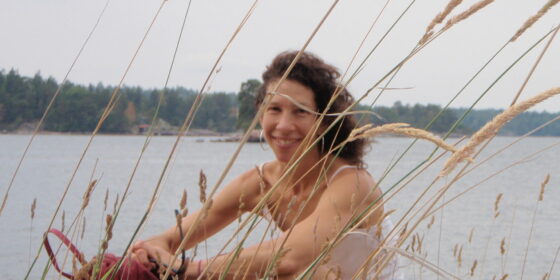Marta Mulholland is the Whidbey Institute’s Volunteer Coordinator. She also assists in the Westgarden, and is currently co-creating a garden curriculum with Westgarden Steward Jules LeDrew to engage Waldorf students in the space. She participated in the 2017-2018 Powers of Leadership Retreat Cycle, and we recently sat down together to reflect on that experience. Here’s our conversation. —Marnie Jackson
Through Powers of Leadership, I gained resources and tools for inner communication and communication with others. The program empowered me even more to follow my own calling, and to do the unique work I feel called to do in the world.
MJ: Can you tell me about your Powers of Leadership experience?

MM: It’s interesting timing for me, as I was also in the second year of a Tamalpa Institute training program in the expressive arts. The two go hand in hand, and they’re both programs of such high quality that I often felt like pinching myself to be sure it was real. The opportunity to participate in both of these programs was such a gift.
Through Powers of Leadership, I gained resources and tools for inner communication and communication with others. The program empowered me even more to follow my own calling, and to do the unique work I feel called to do in the world. It felt extremely supportive, and even tough subjects were handled with compassion and grace. The facilitators created a container that allowed our group to go as deeply as we wanted with hard topics. I appreciated everyone in my cohort—what they brought, and in some cases how far they traveled to be a part of this. I also made some long-lasting friendships.
Can you tell me more about the facilitation style?
Craig Fleck and Christie Lynk are skillful, experienced teachers. They seemed to have such a wonderful time, which added to everyone’s experience! I admired the authenticity, clarity, and presence they brought. In addition, our group experienced presentations from guest speakers each quarter. Each had a very different topic to share, and in very different ways. I was moved by a presentation from Virginia Felton on housing issues, systemic racism, and the diversity of neighborhoods. She started out with a song, and being an expressive arts person myself I was struck by how powerful that was. Virginia reminded me that starting with a song opens peoples’ hearts.
There was a lovely mix of beauty, wisdom, play, and humor throughout the retreat cycle, plus opportunities for peoples’ creativity to be honored.
Craig and Christie did a great job using the entire campus as a context for our learning, including the trails. We went outdoors and learned about our connection to the earth. We spent time in bigger, elegant spaces like the Sanctuary and Thomas Berry Hall as well as cozy, intimate spaces like the Farmhouse living room. There was plenty of room for laughter and connection.
I think what people most want is to be seen, heard, and understood. Many of us walk around holding ourselves so closely because that’s not available to us or because we don’t trust. Powers of Leadership is all about trust.
How does a program like this impact the people who participate, and how might that effect the businesses and organizations in which they serve?
I think participating in this program would be an invaluable investment for anyone looking for more authenticity, more effectiveness, and better relationships at work. I come from a unique place in that our team at the Whidbey Institute is already striving toward clear communication, open mindedness, and practices like check-ins that support the health of the whole. For many members of my cohort, however—even those coming from really great work places—these qualities are missing from the workplace or these practices need more attention. Powers of Leadership offers tools to support bringing healthy practices and perspectives into leadership at every level, in every kind of organization, in any sector. What people discover here can be taken back to work and shared with others. A paradigm shift is possible.
I think what people most want is to be seen, heard, and understood. Many of us walk around holding ourselves so closely because that’s not available to us or because we don’t trust. Powers of Leadership is all about trust. We have so much need in the world, especially right now. Turning on the news each morning, I have to stop and ask, “am I going to turn this on? Am I going to listen to something else? Am I going to stay in silence?” So much is wrong.
What would happen if that paradigm shift does take place?
This kind of change is absolutely critical in our world today. A different relationship with work is possible.
Powers of Leadership is a valuable program that can help guide us towards the critical qualities of leadership and sustainability that are needed as we face world-changing issues now and in the years ahead.

